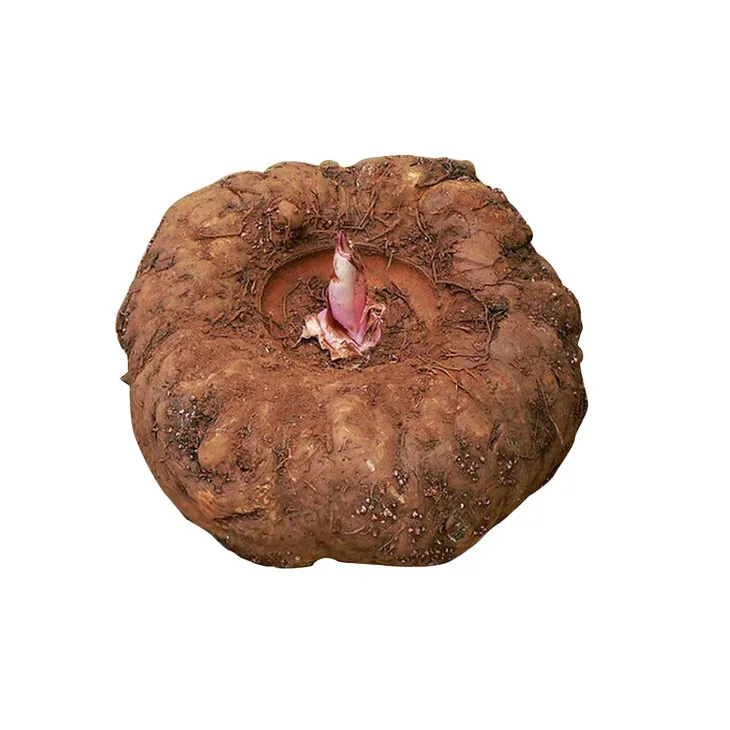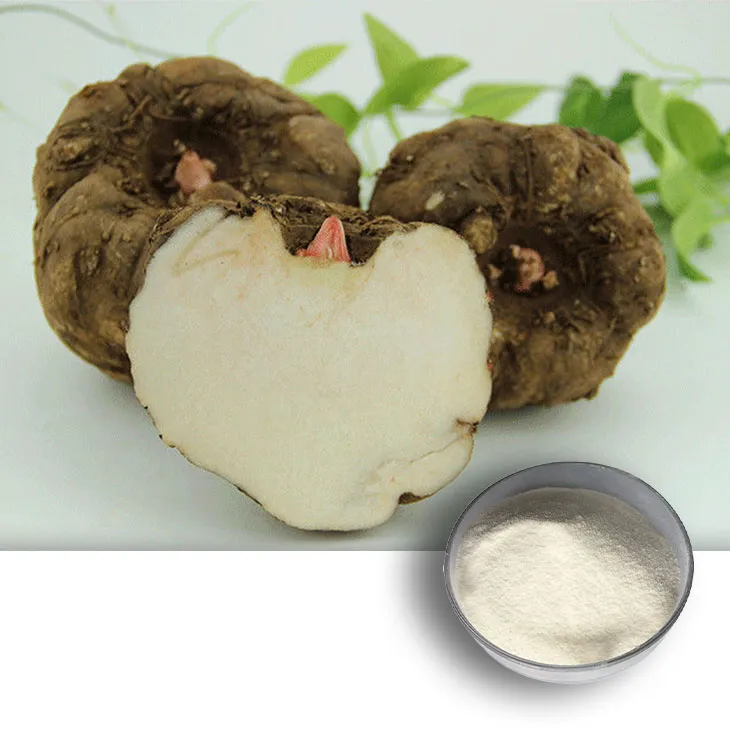- 0086-571-85302990
- sales@greenskybio.com
The best konjac powder in nature.
2024-11-28

Introduction to Konjac Powder
Konjac Powder is truly a remarkable natural product that has been gaining increasing attention in recent years. It is sourced from the konjac plant, which has its own unique ecological requirements and thrives in specific natural habitats. These habitats are often areas with the right combination of soil, moisture, and sunlight conditions.
The main component of Konjac Powder, glucomannan, is what sets it apart. Glucomannan makes up a high proportion of the powder and is responsible for many of its distinct properties. It is a type of polysaccharide that has a long chain - like molecular structure. This structure gives konjac powder its unique ability to interact with water and other substances.

Benefits for Appetite Control
One of the most notable benefits of konjac powder is its role in appetite control. When consumed, konjac powder has the ability to absorb water and expand in the stomach. This expansion creates a feeling of fullness, which can be extremely beneficial for individuals who are trying to manage their food intake.
For example, people on a weight - loss journey often struggle with feelings of hunger between meals. By including konjac powder in their diet, they can experience a reduced appetite as the powder fills up the stomach space. This can lead to a lower calorie intake overall, without the discomfort of constant hunger pangs.

Uses in the Food Industry
The food industry has recognized the unique properties of konjac powder and has been making great use of it.
Konjac Gels
Konjac powder is used to create konjac gels. These gels have a unique texture that is both firm and elastic. They can be used in a variety of food products, such as vegetarian and vegan alternatives to meat - based products. For example, konjac gels can be shaped and flavored to mimic the texture of fish or meat, providing a satisfying alternative for those following a plant - based diet.
Fibrous Snacks
Another application in the food industry is in the creation of fibrous snacks. Konjac powder can be combined with other ingredients to produce snacks that are high in fiber. These snacks are not only delicious but also contribute to a healthy digestive system. They can come in various forms, such as chips or sticks, and are often low in calories compared to traditional snacks.

Health - Conscious Consumers and Konjac Powder
For health - conscious consumers, konjac powder offers several advantages.
Firstly, it is a natural product. This means that it is free from many of the artificial additives and preservatives that are commonly found in processed foods. Consumers who prefer a more natural approach to their diet are increasingly turning to konjac powder as an ingredient in their meals.
Secondly, konjac powder is gluten - free. This makes it an excellent option for individuals with gluten sensitivities or celiac disease. It can be used in a variety of gluten - free recipes, such as gluten - free breads, cakes, and pastries, providing a substitute for wheat - based flours.
Finally, it can fit into a variety of dietary plans. Whether one is following a low - carb diet, a high - fiber diet, or a vegetarian diet, konjac powder can be easily incorporated. It is a versatile ingredient that can be adapted to different cooking and eating styles.

Environmental Benefits
The konjac plant, from which konjac powder is derived, has potential environmental benefits.
It can be grown sustainably in certain areas. The konjac plant is relatively hardy and can tolerate a range of environmental conditions. This means that it can be cultivated in areas where other crops may not grow as well, making use of land that might otherwise be left unproductive.
Moreover, the cultivation of konjac plants can contribute to soil conservation. The roots of the konjac plant help to hold the soil in place, reducing the risk of soil erosion. This is especially important in areas with sloping terrain or where the soil is loose.

Challenges in Konjac Powder Production
Despite its many benefits, there are also some challenges in konjac powder production.
One of the main challenges is ensuring the quality and purity of the powder. Since konjac powder is a natural product, it can be affected by factors such as the quality of the konjac plants used, the processing methods, and the storage conditions. For example, if the konjac plants are not harvested at the right time, the glucomannan content in the powder may be lower than expected.
Another challenge is in the processing of konjac powder to remove any potential toxins. The konjac plant contains small amounts of substances that can be toxic if not properly removed during processing. Therefore, strict quality control measures need to be in place to ensure that the final product is safe for human consumption.
Future Prospects of Konjac Powder
The future looks promising for konjac powder.
As more people become aware of its health benefits, the demand for konjac powder is likely to increase. This will drive further research into its properties and potential applications. For example, scientists may discover new ways to use konjac powder in the development of functional foods that target specific health conditions, such as diabetes or heart disease.
There is also potential for the expansion of konjac powder production in a more sustainable way. With the growing importance of environmental sustainability, efforts can be made to optimize the cultivation of konjac plants and improve the efficiency of the production process. This could lead to a more widespread availability of konjac powder at a more affordable price.
FAQ:
What are the main components of konjac flour?
Konjac flour contains a high proportion of glucomannan, which gives it its distinct qualities.
How does konjac flour help with appetite control?
It has the ability to absorb water and expand in the stomach, which is beneficial for those looking to control their appetite.
What are the uses of konjac flour in the food industry?
In the food industry, it is prized for its ability to create unique textures in products like konjac gels and fibrous snacks.
Why is konjac flour a good option for health - conscious consumers?
It is a natural, gluten - free option that can fit into a variety of dietary plans.
What are the environmental benefits of konjac flour?
The konjac plant can be grown sustainably in certain areas, so konjac flour has potential environmental benefits.
Related literature
- The Nutritional and Functional Properties of Konjac Flour"
- "Konjac Flour: A Sustainable Ingredient in the Food Industry"
- "Glucomannan in Konjac Flour: Health and Dietary Implications"
- ▶ Hesperidin
- ▶ Citrus Bioflavonoids
- ▶ Plant Extract
- ▶ lycopene
- ▶ Diosmin
- ▶ Grape seed extract
- ▶ Sea buckthorn Juice Powder
- ▶ Fruit Juice Powder
- ▶ Hops Extract
- ▶ Artichoke Extract
- ▶ Mushroom extract
- ▶ Astaxanthin
- ▶ Green Tea Extract
- ▶ Curcumin
- ▶ Horse Chestnut Extract
- ▶ Other Product
- ▶ Boswellia Serrata Extract
- ▶ Resveratrol
- ▶ Marigold Extract
- ▶ Grape Leaf Extract
- ▶ New Product
- ▶ Aminolevulinic acid
- ▶ Cranberry Extract
- ▶ Red Yeast Rice
- ▶ Red Wine Extract
-
Red Wine Extract
2024-11-28
-
Phyllanthus Emblica Extract
2024-11-28
-
Acerola Juice Powder
2024-11-28
-
Saponin Extract
2024-11-28
-
Chaste Berry Extract
2024-11-28
-
Kelp Extract Powder
2024-11-28
-
Almond Extract Powder
2024-11-28
-
Eyebright Extract
2024-11-28
-
Cocoa Extract
2024-11-28
-
Red Vine Extract
2024-11-28





















